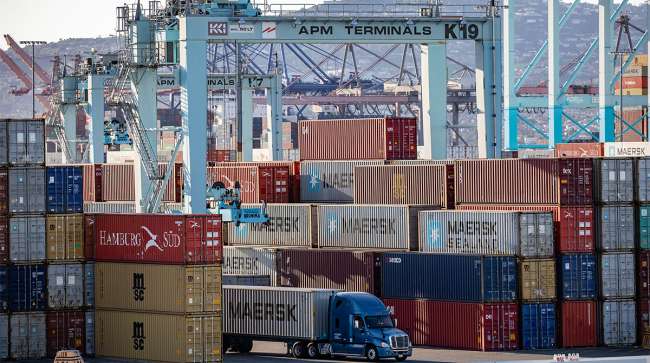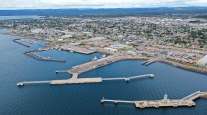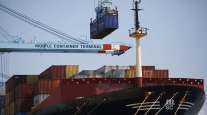Staff Reporter
California Awards $27 Million to Container Ports

[Stay on top of transportation news: Get TTNews in your inbox.]
California’s business and economic development office has awarded $27 million to fund 10 projects at its five container ports to improve data systems and interoperability to strengthen the nation’s supply chain.
Currently, the state’s ports of Hueneme, Los Angeles, Long Beach, Oakland and San Diego handle 40% of all containerized goods coming into the United States and 30% of the nation’s containerized exports.
“California’s ports are critical to the stability of our national and global supply chains as well as the health of our worldwide economy,” said Dee Dee Myers, director of the California Governor’s Office of Business and Economic Development. “These historic, first-of-their-kind awards will allow us to use data to improve the functionality of our supply chain, and we look forward to working with our ports to further the momentum that these projects will generate across the state.”
The awards, from the California Containerized Ports Interoperability Grant Program, were announced July 11. The money came from a 2023 state legislative allocation to strengthen the supply chain after the COVID-19 pandemic. In April 2023 the state’s five container ports entered into a memorandum of understanding to jointly share real-time data and create information interoperability to improve freight system resilience, increase efficient cargo movements, lower emissions and bolster economic competitiveness.
The largest amounts of funding were allocated to the Port of Los Angeles (29.4% for three grants totaling $7.95 million), Port of Long Beach (29.2%, three grants amounting to $7.87 million), the Port of San Diego (a single $4.24 million award) and the Port of Hueneme (a $4.24 million grant). The smallest grants (two totaling $3 million) went to the Port of Oakland.
We're excited to announce $27M in grants to support data system development & interoperability across our 5 containerized ports! 🚢
This is 🇺🇸's first-ever state-level funding meant to improve data functionality across a statewide network of ports.
🔗 https://t.co/JqAXOLwExW pic.twitter.com/OdJWDtwSx6 — GO-Biz (@CAGoBiz) July 11, 2024
In analyzing the project proposals, a technical advisory committee evaluated factors such as a port’s 20-foot-equivalent-unit volume, vessel dwell times, container dwell times, truck turn times, data needs, proposed interoperability improvements and a project’s overall impact on the state’s port system.
The Port of Los Angeles will use the funding on three projects to create a foundation for a mobile app to enhance data visibility, develop a Carbon Intensity Gateway for environmental and emissions data, and expand its trucking appointment system by integrating AI.
The plan is to extend the in-development appointment system by integrating cross-terminal scheduling with near real-time container-tracking data into a single platform. The port will be better able to identify and move available containers through a scheduling function that lists all available appointments across the entire port complex. In the future, the Port of Los Angeles’ current system design may be integrated with other port trucking appointment system data feeds, especially with the Port of Long Beach. The two San Pedro Bay ports are negotiating to build a long-term business model to fulfill the needs of truckers, according to the California Containerized Ports Grant program report.
California port grants program
Gene Seroka, Port of Los Angeles executive director, said, “California is the first state to step up with policy and funding to enhance supply chain digitalization. This GO-Biz funding will help the Port of Los Angeles accelerate our proven technology, the Port Optimizer, to further improve efficiency, lower impacts on our communities and make us more competitive.”
The Port of Oakland will make improvements by developing an integrated data environment for upstream/downstream stakeholders and implement a Unified Terminal Appointment System for more flexible scheduling to improve drayage efficiency. A major goal will be to reduce truck turn times and traffic queuing by using better data to change traffic behavior and improve circulation.
Bryan Brandes, maritime director at the Port of Oakland, noted that the funding will enable the port to “improve the trucker appointment system in Oakland to allow for a more seamless user experience. These enhancements are critical in improving overall supply chain visibility, efficiency and planning at the local, state and national levels.”
California Transportation Secretary Toks Omishakin said the funding and strong collaboration among the state’s ports will provide better essential data to help move cargo in a more efficient, reliable and resilient transportation network.
Want more news? Listen to today's daily briefing below or go here for more info:




